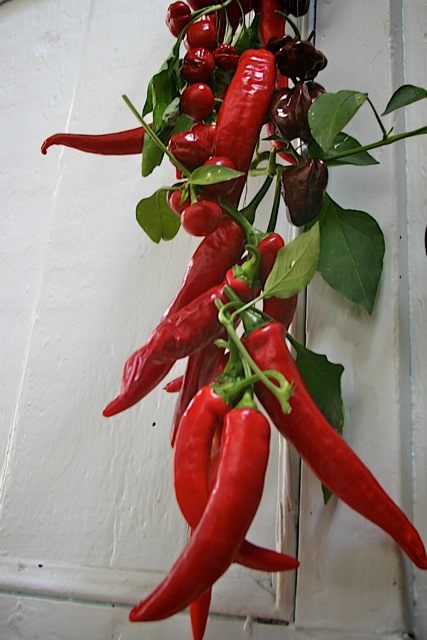
primary-image, l
(post, Judith Klinger)

primary-image, l
I'm a strega without her broom. A strega is a witch and I’m feeling like a strega without a broom. No, I'm not talking about cleaning; I’m talking about not having my familiars about, my spices, herbs, oils, vinegars, jars, bottles: my tools of the kitchen trade. Coming back to NYC, to an empty kitchen is one thing. But as I go around the kitchen seeing what I need to start cooking again, I’m realizing what a disconnect the average US person has from their food supply. I’ve gotten used to getting my eggs from Bruce’s obliging chickens, I reach for chili peppers that I grew and dried, I have jars of summer produce and I know I shared the same hot summer sun as that basil, buying cheese isn’t a plastic shrink wrapped affair, it’s a trip to the cheese maker, which involves having a long chat about life and only then do I get the carefully wrapped piece of cheese. It sounds so romantic and nostalgic, but that’s because how many of us feed chickens and clean out coop, or get up pre-dawn to milk sheep? Romanticism aside, I was physically connected to my food and now I’m in the city buying food that I don’t know anything about. According to the last US Census in 2000, 80% of us live in urban areas. Since you are reading this, it’s safe to assume you care about food and know what time of year tomatoes are at their peak. It’s also a reasonable bet that you are in the minority. After a screening of the film, Food Inc., at the New School, there was an excellent discussion panel and Jill Richardson, the moderator, told of talking to people who literally thought that spaghetti was harvested from a plant, or that pumpkins grew on trees. Sounds ridiculous, but what if you never had any opportunity or reason to know better? It’s like having street smarts, I don’t walk around with my handbag open or put it on the back of my restaurant chair, but that nice lady from a small town in Iowa who is an instant target for an urban pickpocket, how could she know better? Tomatoes are always in the supermarket, apples are always in a school cafeteria, and cherries appear at Christmas time, how would someone know the season for these fruits? Food Inc. is a cornerstone film in the way that Inconvenient Truth was. It’s a wake up call to everyone that we need to look at what’s going on with our food sources and the culture of eating. The film attempts to highlight many of the key areas of concern: industrialized meat operations, consolidation of crops, exploitation of workers, obesity, fuel and water consumption, cheap junk food versus expensive healthy food, the implications of patenting seeds, etc. etc. etc. etc. But, the part that struck home for me was the family that ate dinner together….in their car, after getting a drive through hamburger meal. The mother’s reason was long working hours so cooking was impossible and it was cheaper than eating healthy. She had been under the impression that a drive-thru burger meal was healthy. The camera then follows them into a supermarket where we see that chips and soda are much cheaper than a bunch of broccoli. My heart broke. I think the family may have been Mexican-American, so somewhere in that mother’s history is a long and beautiful culinary tradition. Where did it go? How did it get lost? What happened that we are so disconnected from our food? What legacy will she give to her daughters? After the film and the panel discussion there was Q&A time and one audience member made a staggering point: food memories are a very strong touchstone. If the times you remember eating as a family are shared at a McDonalds, then the smell of McDonalds will always be warm and fuzzy and comforting. There is no magic bullet cure, we are talking about a systemic multi-generational disconnect from our food and cooking and dining together. The film cobbled together some band-aid slogans at the end of the film to make us all feel better: Eat organic. Plant a garden. Etc. These are noble sentiments, not a blueprint to a return to respecting our food. The last audience member asked a very simple question to the panel, “What can I do?” And a very wise Marion Nestle replied, “Pick one cause.” She’s right; no one person can provide us with solutions. Stonybrook’s organic yogurt is now available at Wal-Mart; that was Gary Hirschberg’s small step towards bringing a good product to many. My battle? Bringing people back together to the dining room table and letting people know that cooking isn’t so hard. See the film. Make some choices of your own.